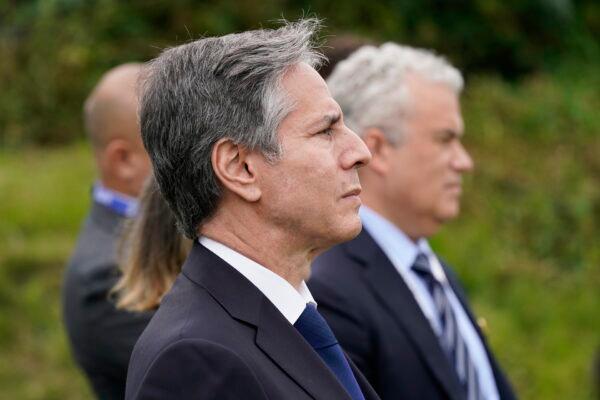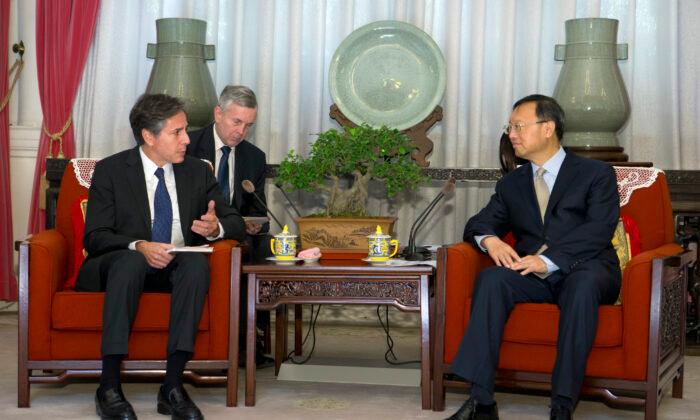BEIJING—Top U.S. and Chinese diplomats appear to have had another sharply worded exchange, with Beijing saying it told the United States to cease interfering in its internal affairs and accusing Washington of politicizing the search for the origin of the COVID-19 pandemic.
Yang Jiechi, senior Chinese foreign policy adviser and Antony Blinken, U.S. secretary of state, held a phone call Friday that revealed wide divisions in a number of contentious areas, including the curtailing of freedoms in Hong Kong and the mass detention of Muslims in the northwestern Xinjiang region of China.
Calls for a more thorough investigation into the origin of the SARS-CoV-2 virus that causes COVID-19 are particularly sensitive for the Chinese regime because of suggestions that it might have escaped from a virus laboratory in the central city of Wuhan, where cases were first discovered.
Yang said China was “gravely concerned” over what he called “absurd” stories that the virus escaped from the Wuhan lab.

The State Department said Blinken “stressed the importance of cooperation and transparency regarding the origin of the virus, including the need for [World Health Organization] Phase 2 expert-led studies in China.“
The United States and others have accused the Chinese regime of failing to provide the raw data and access to sites that would allow a more thorough investigation into where the virus sprang from and how it initially spread.
Equally contentious were the issues of Hong Kong, Xinjiang, Taiwan, and accusations that China has arbitrarily detained two Canadian citizens in retaliation for Canada’s arrest of an executive of Chinese communications technology giant Huawei, who is wanted by U.S. law enforcement.
The United States has “fabricated various lies about Xinjiang in an attempt to sabotage the stability and unity in Xinjiang, which confuse right and wrong and are extremely absurd. China is firmly opposed to such actions,” Yang said.
“Hong Kong affairs are purely China’s internal affairs,“ and those found in violation of a sweeping national security law imposed on the former British colony “must be punished,” Yang said.
Blinken, on the other hand, underscored U.S. concern over the deterioration of democratic norms in Hong Kong and the ongoing “genocide and crimes against humanity against predominantly Muslim Uyghurs and members of other ethnic and religious minority groups in Xinjiang,” the State Department said.
He also urged Beijing to ease pressure against Taiwan, the self-governing island democracy China claims as its own territory and says will be annexed by force if necessary.
The tone of the phone call seemed to echo talks in March in Alaska, when the sides traded sharp and unusually public barbs over vastly different views of each other and the world in their first face-to-face meeting since President Joe Biden took office.
Relations between them have deteriorated to their lowest level in decades, with the Biden administration showing no sign of deviating from the established U.S. line against China over trade, technology, human rights, and China’s claim to the South China Sea.
On Thursday, China’s ceremonial legislature passed a law to retaliate against sanctions imposed on Chinese politicians and organizations, threatening to deny entry to and freeze the Chinese assets of anyone who formulates or implements such measures, potentially placing new pressure on foreign companies operating in the country.






Friends Read Free